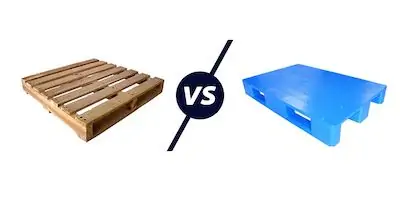The requirements for plastic pallets for international shipping are quite different from domestic shipping. Plastic Export Pallets are defined by ISPM-15. The clauses of International Standards for Phytosanitary Measures No. 15 were developed and constituted by IPPC.
Hence, these standards affect the quality of the export shipping pallets and how to prepare pallets for freight shipping.
More About IPPC
IPPC, short for international plant protection convention is a treaty that was signed in the year 1951. It is managed by the Food and Agriculture Organization. The motive of FAO is to eliminate the diseases and the potential pests that affect the plantation in other countries.
What is ISPM-15?
The ISPM-15 requires all wooden pallets, which are shipped internationally, to meet certain requirements, standards, and specifications. The regulations of ISPM-15 are not applied when the wooden pallets are shipped to the US or Canada. However, these regulations apply when the wooden pallets are shipped to other countries, such as Africa.
Are Plastic Pallets Exempt From ISPM-15?
Safe packaging during international shipping is quite important and a no-brainer. Every day loads of containers accidentally drop during transit. Ensuring that your cargo is safely packed is the best way to save your reputation in the supply chain business.
Therefore, finding optimal export shipping pallets for your business is crucial to ensure that your cargo remains safe during transit.
Export Pallet Choice for International Shipping
Besides packing your cargo safely, you need to pay good attention to the material of the export shipping pallets. Most countries have strict regulations on wooden shipping containers. If you are using wooden pallets, ensure that they comply with the IPCC regulations.
If you want to lower costs and speed up the shipping process, these shipping pallets made of plastic are quite ideal to hold any sort of cargo.
Treated Vs. Untreated Export Shipping Pallets
When shipping cargo within the United States, you can use pretty much any pallet you want, regardless of the type. By the laws bounding the supply chain business, you are free to recycle the very pallet that you had used for your last shipment.
Moreover, you are also allowed to build your custom crate or pallet through a local expert. But things get trickier when you decide to ship the cargo internationally.
All treated shipping pallets must get the International Plant Protection seal, also referred to as the Wheat stamp.
As long as your pallets have the said, they are either heated or chemically treated by the manufacturer. In short, you are free good to go with stamped export shipping pallets.
However, you might get into a whole world of trouble if you get caught with any unstamped or untreated export shipping pallet by customs.
Heat Treated Or Fumigated?
Standards of ISPM-15 state that all wood pallets used for international shipping must be heat treated or fumigated by the manufacturer.
During the heat process, the wooden pallet is heated until the temperature reaches 56 degrees Celsius in its core. Moreover, the wooden pallet is held under the same temperature for 30 minutes. This way, all harmful bacteria, pests, mold, and germs harmful to the plantations and forests are destroyed. While heat treatment is considered the best solution, fumigation is also carried out by some manufacturers.
Once heat treated, the wooden pallet does not have to bear the same process. It can be used for export shipping over and over again until one of the components of the pallet is replaced.
Upon completion of the heat treatment process, the wooden pallet gets the seal by International Plantation Protection. The seal shows the type of method as well as the origin.
Wood Vs. Plastic Export Shipping Pallets

Many supply chain businesses are turning to plastic export shipping pallets over wood pallets. Plastic export pallets allow you to ship the products domestically and internationally without any hassle.
The other reason why companies now prefer plastic pallets over wood pallets is that they can be reused many times. They don’t suffer as much wear and tear as wood pallets. You don’t have to worry about them splinting soon. And there is a lumber supply shortage as well. Consequently, they are a good investment for your supply chain business.
Plastic Pallets Are Exempt From ISMP-15 Regulations
Due to the natural composition of plastic pallets, they are exempt from ISMP-15 regulations. Plastic export shipping pallets are unable to become a haven or host to bacteria, germs, pests, and mold. Therefore, they don’t require any treatment prior to the international shipment.
Moreover, they are lightweight, durable, and can be molded in different designs and sizes. They can nest, which allows you to ship the cargo in stacks.
Verdict
It’s worth choosing plastic pallets over traditional wooden pallets.
Investing in plastic pallets doesn’t only cut down your shipping costs but also exempt the shipment from ISPM-15 regulations.


